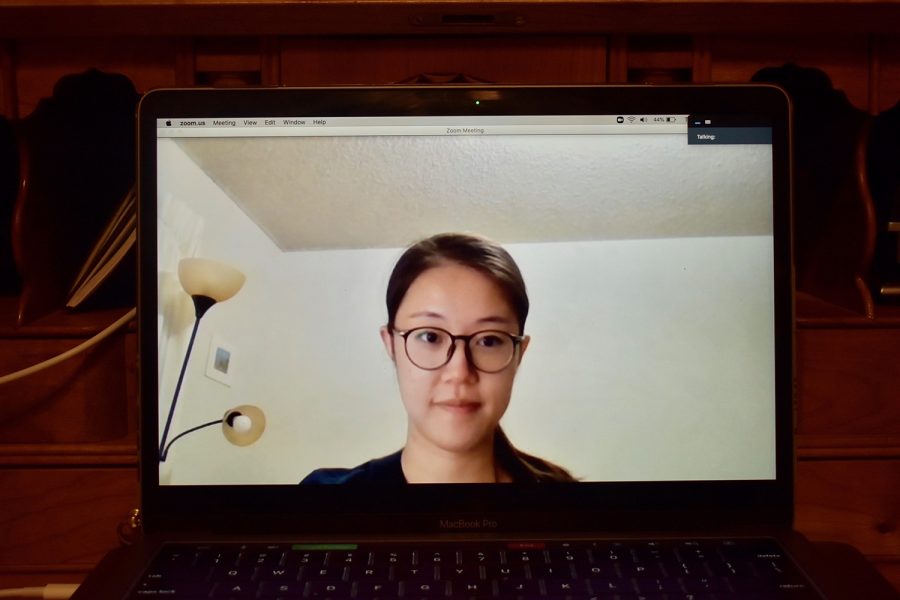Federal proposal could limit the duration of status for international students
The University of Iowa and the Big Ten Academic Alliance are publicly opposing the proposed change that would require international students to go through a drawn-out submission and approval process to extend their stay while completing their programs.
Graduate student Yujia Lyu photographed on Oct. 20.
October 21, 2020
A new change to the Code of Federal Regulations proposed by the Trump administration would limit international students’ stays and would require students from some countries required to request costly extensions as often as every two years.
Public comment on the proposed rule change — which was proposed Sept. 24 — will close Oct. 25, and feedback given to the Department of Homeland Security before any changes would be made.
The University of Iowa and Big Ten Academic Alliance opposed the rule, citing additional costs and travel burdens the rule would place on international students trying to complete their degrees. Russ Ganim, Associate Provost and Dean of the international programs wrote in a statement that the proposed rule “will make it very difficult for U.S. universities to continue to attract the best and brightest students from around the world, and to benefit from their intellect.”
The proposed rule change would change Code of Federal Regulations that would limit the Duration of Status for international students.
Current regulations allow international students to stay in the U.S. as long as they are continually making progress toward their degree and are registered as a full-time student, Michael Bortscheller, University of Iowa associate director of International Student and Scholar Services, wrote in an email to The Daily Iowan.
“That means that if a student adds a second major and needs more time or if they encounter some unexpected research difficulty which prevents them from graduating when they originally expected,” Bortscheller said. “They can just work with their school to report this to the government and their stay in the U.S. is automatically extended.”
The proposed change would eliminate the possibility for international students to work with their schools to inform the government about their extended stay, Bortscheller said. They would instead need to submit applications and fees to U.S. Citizenship and Immigration Services and wait for approval.
Bortscheller added that the proposal limits the amount of time students are initially granted to complete their programs. Most students would be granted four years, but students from certain countries, like Papua New Guinea, would only be granted two before they’d need to seek an extension. All students would have to continually apply for extensions at the end of this time.
“The current application fee for the form used for the extension of stay is $370. There is a separate biometrics fee of $85 and students would be required to travel to Des Moines in order to complete their biometrics appointment,” Bortscheller said. “So this would be a substantial monetary and time investment each time a student needs an EOS.”
Bortscheller said this proposal could reduce the already decreasing number of international student enrollment.
“International student recruitment is already difficult in this environment and our goal is to make international students feel welcome.” Bortscheller said. “This proposed change would introduce burdensome regulations in addition to increasing the costs of simply staying in the U.S. I think the most likely outcome is that this rule would reduce the number of international students who want to come to the U.S.”
Yujia Lyu, a fifth-year graduate student from China said this would affect students like her because Ph.D. programs theoretically take about five years to finish, so she would have to apply for at least one extension.
Lyu said that the process to receive extension approval will most likely be long and grueling as the immigration system is already backlogged.
“For me when I first saw this, my gut reaction was: what is this?” Lyu said. “What did they come up with something new to add burdens to our, to my study progress, or will this actually impact me?”
Lyu said after learning more about the proposal, she became more frustrated. Especially as the proposal comes not long after an order from ICE that — until rescinded — would have blocked international students from studying in the U.S. if their courses were all-virtual.
“So, it’s just like a weird experience of waves and waves of frustration, because they keep producing new policies to restrict our ability and our education progress,” Lyu said.
Lyu said she has been trying to spread the word about the proposal as much as she can, because it hasn’t gotten nearly as much media attention as the ICE international student proposal had — but it has the power to still really affect students studying in the U.S.
Lyu said she thinks the confusion paired with uncertainty makes the policy even more burdensome.
Peiqi Chen, a UI undergraduate student from China said the proposal feels awkward and too restrictive on international students and she expects it will deter students from wanting to come here.
“I think it’s very risky and also kind of annoying,” Chen said.
The UI senior said she’ll have to take the policy proposal into consideration when applying for graduate schools, as her visa is set to expire this year.
“I still hesitate about whether or not I should choose the UI [to continue] my schooling for the next couple of years,” she said, noting that she is considering schools outside of the U.S.
Inga Popovaite, a UI grad student from Lithuania currently in her sixth year of her Ph.D. program, said when she heard about the proposal it felt like a desperate repeat of the ICE proposal.
“I feel disappointed, because it’s just another obstacle for international students who want to get education in the United States,” Popovaite said. “Especially for graduate students, because it is impossible to complete a Ph.D. program in four years.”
Popovaite said the idea that a proportion of international students will have to apply for visa extensions to complete their programs is nerve racking and time consuming.
“So basically, everyone who’s applying next year, who’s coming next year, will apply for visa extensions the same year, and that will be a nightmare for everyone involved,” she said.
Popovaite said international students and advocates are exhausted with trying to keep up with all the proposed regulation changes. She added that universities such as the UI worked hard to get the July proposal overturned in a week, but she doesn’t think that energy is there anymore.
“…But it’s also disheartening to see how people don’t care about it. And, being [an] international student here, you just feel less and less welcome,” Popovaite said. “You see that people — the country itself, it just doesn’t want you here, and it’s very disheartening.”
Popovaite said if she were to start her graduate program right now, she would not even look in the U.S.
“I would go somewhere to Western Europe, or Canada, somewhere else where immigration laws are way more predictable and easier to navigate,” Popovaite said.
After finishing her program, Popovaite said she was already determined to go back to Europe, and the proposed changes just reinforces that decision even more.
Going back to 2015, when she started her program, Popovaite said she didn’t have to think about these potential problems. She said she felt the same way as she did when completing her Masters in Budapest, that people were nice and everyone was welcome.
“But nowadays it’s just one after the other, and proposed changes really take away this feeling of everyone is welcome and yeah — it is different,” Popovaite said.
Popovaite said she hopes people will leave public comments that call out the ridiculousness of the proposed draft before it goes under review by the U.S. Department of Homeland Security.
“There are feelings that this country just doesn’t want us anymore. That we [are] just not welcome.” Popovaite said. “It’s harder just to want to stay here … when you see that people––not people, but the government wants you to leave.”






